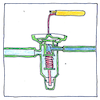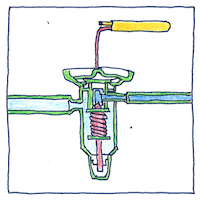James Prescott Joule,
William Thomson, Lord Kelvin
thermodynamics

|
Joule-Thomson effect
James Prescott Joule and his friend Lord Kelvin showed that passing gas through a throttled orifice letting it expand causes it to cool. Specifically, we are not accelerating the gas and we insulate the orifice to avoid exchanging heat.
Purpose
To move heat from a cold place to a warm place for refrigeration heating and liquifying gases
Enthalpy
The energy in a system equal to its internal energy plus the product of pressure and volume measured by the joule.
Orifice
Throttle valve or porous plug irreversible aperture a passageway that gins up the cycle.



Joule-Thomson expansion converts kinetic energy to potential energy. It does no work. An alternative is a turbine, which in doing work removes energy from the gas.
See also in The book of science:
Readings in wikipedia: